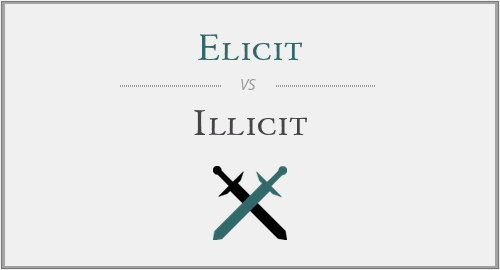
Elicit” and “illicit” are different spellings for the same concept? They seem to be, according to how similarly they are pronounced, and to the fact that somehow, they both refer to something related to information, in various contexts. Seems fair enough? Well, it’s not. “Elicit” and “illicit” are certainly not two version of the same notion – they are not even synonyms!
Yes, they are spelled similarly, but this is just a random coincidence. If “elicit” is ever used instead of “illicit” or vice versa, the words will certainly be misspelled. They define completely different things and are used in distinct contexts. Check these below to make sure you are never confused and never confuse your public either.
Elicit vs. Illicit
First of all, “elicit” can never by synonyms with “illicit” because they function as different parts of speech in a sentence. “Elicit” is a verb, while “illicit” is an adjective. “Elicit” defines an action, “illicit” describes something.
In addition to this, “illicit” appears more frequently in the usual English vocabulary than “elicit”, because the latter is only used formally, in official contexts. But you can find out more and explained better in the examples provided below, regarding the right ways to use “elicit” and “illicit” in your English conversations.
When do we use “elicit”?
“Elicit” is a verb, defining the action of extracting information. The word is mainly used formally, not in daily conversations. It is a more elegant way of defining the action of obtaining a reaction or some information from someone.
Example: If you want to elicit any kind of useful and accurate information from somebody, it is mandatory that you clearly ask the right questions, even several times if it’s necessary. – “elicit” is a verb, referring to getting information from someone.
When do we use “illicit”?
Unlike “elicit”, “illicit” is used in any kind of context, functioning as an adjective. The word describes something that is not approved of the society or something that is illegal.
Example: They had an illicit love affair, so they were chased away from their village. – “illicit” is a common adjective, used to describe something illegal or which is not accepted by the society.
Conclusion
Yes, “elicit” and “illicit” sound similar, and this might be a little confusing and tempt you to believe they refer to the same thing. But they never will because these words are different both regarding grammar and vocabulary. They have completely distinct functions and meanings as well. Remember “elicit” is a formal verb (“getting information”), while “illicit” is a usual adjective (“illegal”).




Have a discussion about this article with the community:
Report Comment
We're doing our best to make sure our content is useful, accurate and safe.
If by any chance you spot an inappropriate comment while navigating through our website please use this form to let us know, and we'll take care of it shortly.
Attachment
You need to be logged in to favorite.
Log In